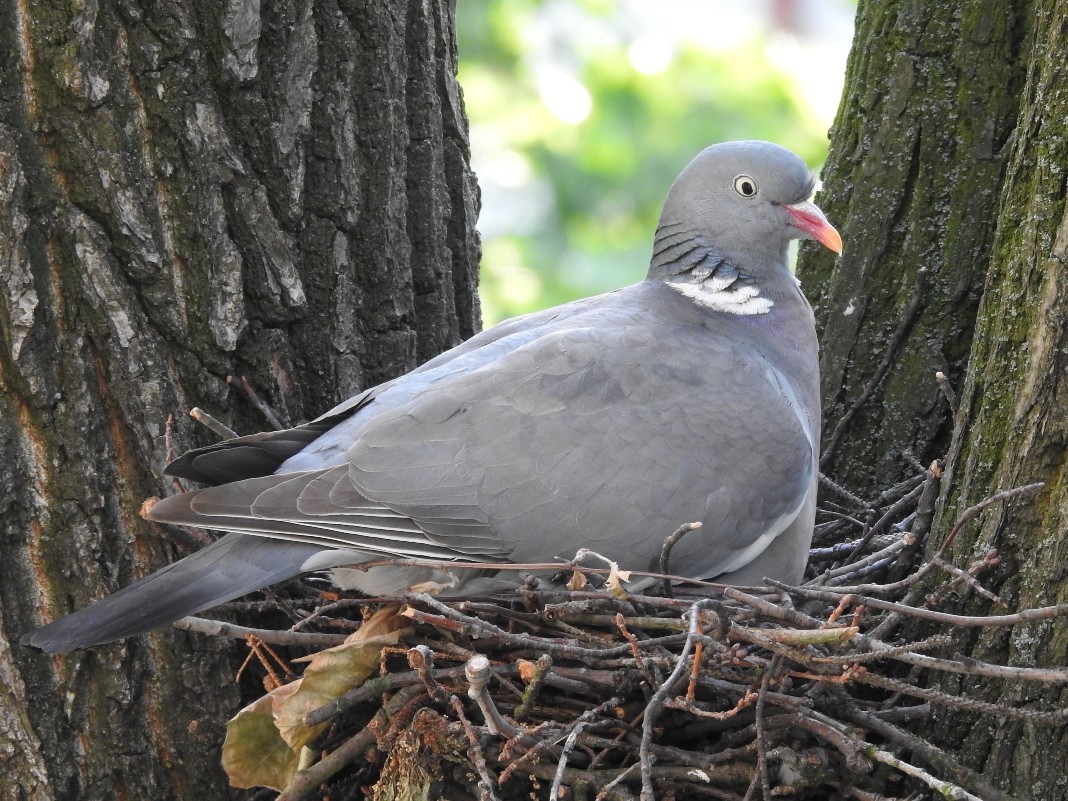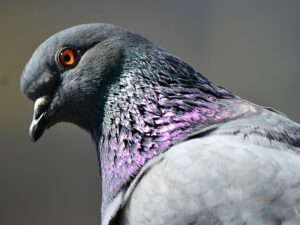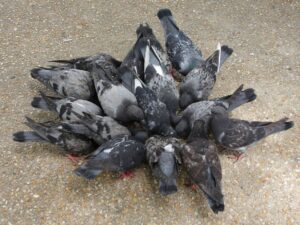If you’re reading this, you’re probably interested in the intelligence of pigeon populations, an animal species that is often overlooked and underestimated.
Despite their reputation as disease-ridden winged rats, pigeons are actually highly intelligent birds with cognitive abilities that rival those of some primates.
Pigeons are found all over the world and are considered to be among the most intelligent birds in the animal kingdom.
So the next time you see someone feeding pigeons in the park, remember that these birds are much more than just a “bird brain”!
In this article, we’ll be taking a closer look at the intelligence of pigeons and exploring some of the impressive cognitive abilities that make these animals stand out in the animal kingdom.
JUMP TO:
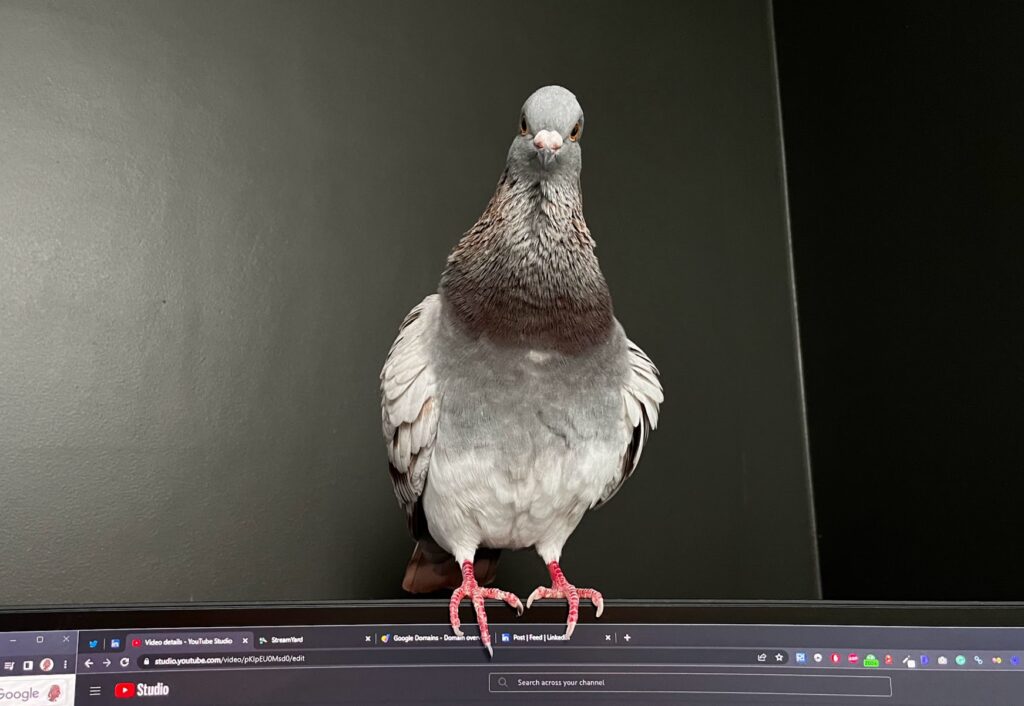
How smart are pigeons? Let’s look at the history.
Let’s first take look at the history of pigeon intelligence research, starting with some of the earliest studies on these intelligent birds and moving on to recent advancements in research techniques.
So let’s dive in and see how our understanding of pigeon intelligence has evolved over the years!
Early studies on pigeon intelligence
Pigeons have long been a subject of scientific study, and researchers have been fascinated by their intelligence for centuries.
In fact, some of the earliest recorded studies on animal cognition were conducted on pigeons! Pigeons have the capacity to be trained and can undertake tasks previously thought to be beyond their capabilities.
One of the first scientists to study pigeon intelligence was a man named William James, who published a paper in the late 1800s on the ability of pigeons to learn and remember complex patterns.
New Zealand researchers
New Zealand has a long history of research on pigeon intelligence and cognition. Some of the notable researchers and studies on pigeon intelligence in New Zealand include:
- Dr. John Mitani, a professor at the University of Auckland, who conducted pioneering research on the social intelligence of pigeons in the 1990s. Dr. Mitani’s work helped to shed light on the complex social behaviors of pigeons and their ability to communicate with each other.
- Dr. Anna Wilkinson, a senior lecturer at the University of Auckland, who has conducted research on the cognitive abilities of pigeons, including their ability to learn and remember complex patterns and their use of tools to solve problems.
- Dr. Alex Kacelnik, a professor at the University of Oxford, who conducted research on pigeon intelligence while he was a researcher at the University of Auckland. His work focused on the decision-making abilities of pigeons and the underlying mechanisms that allow them to make complex choices.
These are just a few examples of the many researchers who have contributed to our understanding of pigeon intelligence in New Zealand.
The country has a rich history of research on these amazing birds, and I’m sure we’ll continue to see exciting new findings in the future.
Recent advancements in research techniques
Since then, there have been countless studies on pigeon intelligence, and our understanding of these birds has only continued to grow. In recent years, researchers have made some exciting advancements in the techniques they use to study pigeon cognition. For example:
- Pigeons can now be trained to use touch screens, allowing researchers to study their cognitive abilities in more detail than ever before.
- Researchers are using advanced imaging techniques, such as fMRI, to study the brain activity of pigeons as they perform various tasks.
- Scientists are also studying the behavior of pigeons in more naturalistic settings, such as in the wild or in aviaries, to get a better understanding of their intelligence in a more realistic context.
Overall, the study of pigeon intelligence is an active and rapidly evolving field, and we have much left to learn about these fascinating birds.
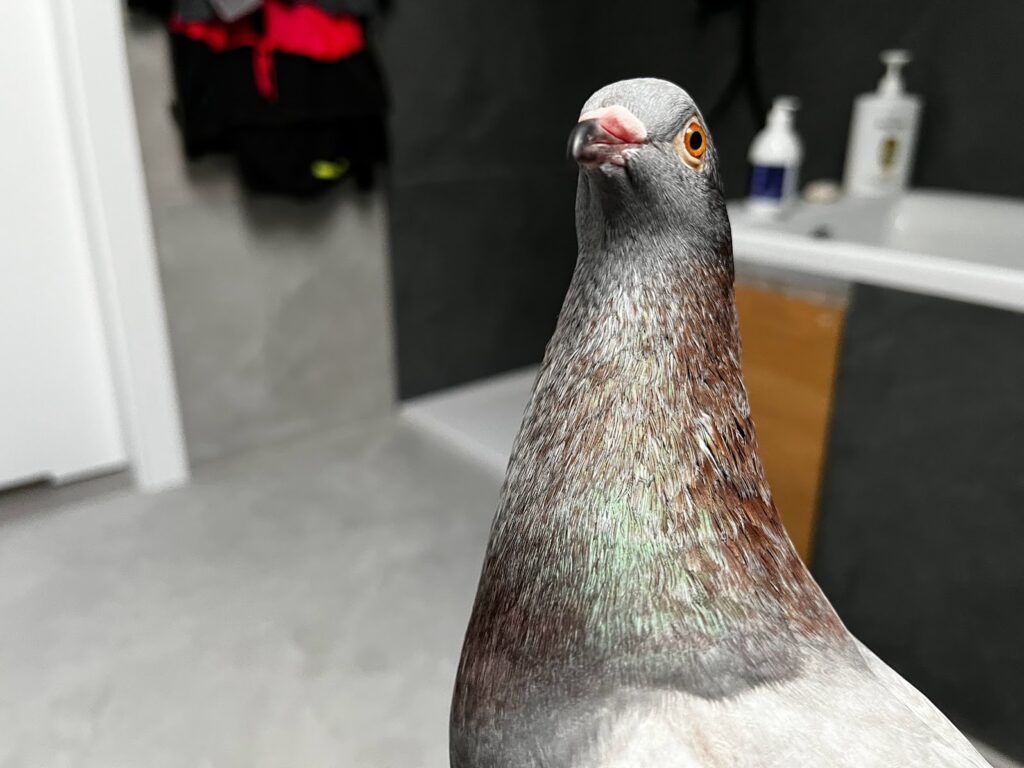
Are pigeons smart? Yes!
Let’s now explore some of the cognitive abilities of pigeons, including their problem-solving skills and decision-making abilities. You might be surprised at just how intelligent these birds really are, so let’s dive in and take a closer look!
Examples of impressive cognitive abilities of pigeons
Pigeons are known for their impressive cognitive abilities, and they are able to use a variety of visual cues and clues to navigate their environment and make decisions.
For example, pigeons are able to use visual cues to locate and retrieve food, and they are also able to use their own body movements and positions to communicate with other pigeons.
One aspect of pigeon intelligence that has received a lot of attention from researchers is their ability to use visual cues to find and retrieve food.
Pigeons are able to learn and remember the location of various food items, and they are able to use visual clues such as the shape and color of an object to guide their search. Pigeons are also able to use their own body movements to communicate their intentions to other pigeons, such as by bowing or cooing to signal their interest in food.
Another area where pigeon intelligence is apparent is in their ability to use food rewards to learn new tasks (I don’t mean a simple task here).
Pigeons are able to learn complex tasks through reinforcement learning, in which they are rewarded with food for performing the desired behavior.
This ability to use rewards to learn and adapt to new environments is thought to be a key factor in the intelligence of these birds.
Examples of complex problem-solving and decision-making in pigeons
One of the things that makes pigeons so interesting to researchers is their impressive cognitive abilities. These birds are capable of solving complex problems and making decisions based on their experiences, just like humans and other intelligent animals.
For example, pigeons have been shown to be able to learn and remember the locations of various objects, and they can even use this knowledge to make decisions about which object to retrieve based on its value or availability.
Pigeons have also been observed using tools to solve problems, such as using sticks to retrieve food from hard-to-reach places.
Comparison to other animals (e.g. primates, birds)
But how do pigeon cognitive abilities compare to those of other animals? Well, it’s worth noting that while pigeons may not be as cognitively advanced as some primates, they are still considered to be among the most intelligent birds.
In fact, some studies have even suggested that pigeons may be capable of cognitive abilities similar to those of dolphins and elephants!
Overall, it’s clear that pigeons are much more intelligent than many people give them credit for, and they have a lot more going on upstairs than you might think.
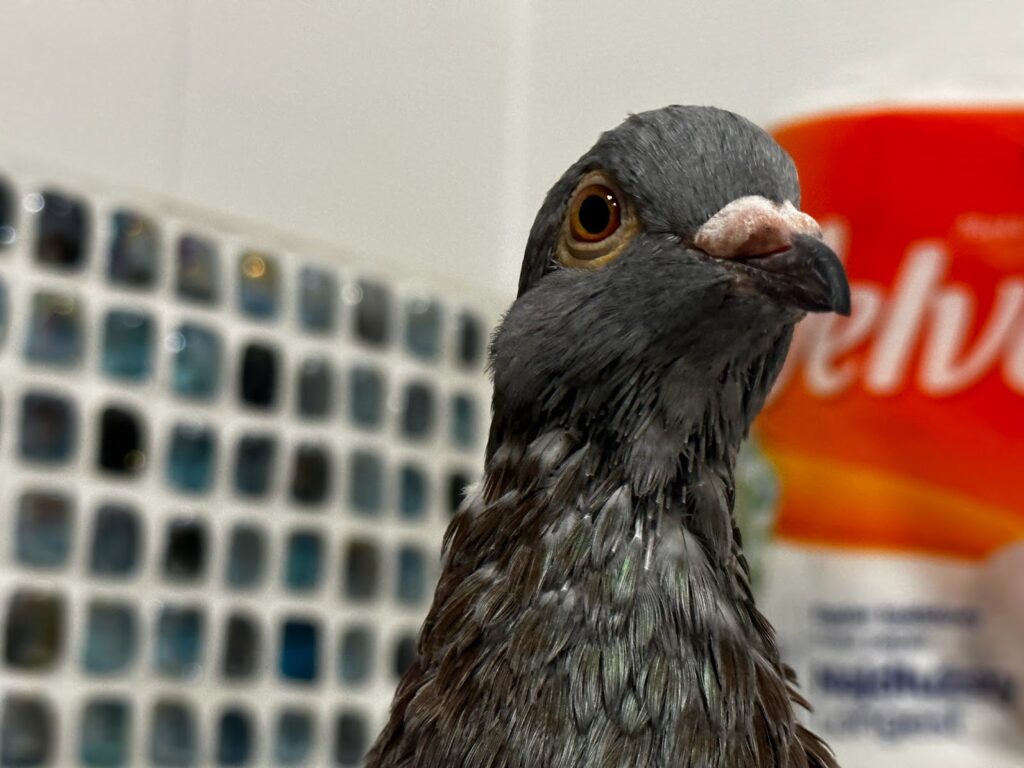
Pigeons’ use of memory and learning
Let’s now take a look at the impressive memory and learning abilities of pigeons. From their ability to recognize hundreds of different objects and images to the underlying mechanisms that allow them to retain this information, there’s a lot to learn about these fascinating birds. So let’s dive in and see what makes pigeon memory and learning so special!
Studies on pigeon memory and learning abilities
Pigeons have long been known for their impressive memory and learning abilities, and scientists have conducted numerous studies to explore these capabilities in more detail.
For example, researchers have found that pigeons are able to remember and recognize hundreds of different objects and images, and they can even remember the location of objects they have seen in the past.
But what makes pigeon memory and learning abilities so impressive? One factor is the size of their brains relative to their body size.
Pigeons have a relatively large brain compared to other birds, which may contribute to their cognitive abilities.
Another factor is the structure of their brains – pigeons have a region called the optic lobe that is responsible for processing visual information, and this region is highly developed in these birds.
Implications for understanding animal intelligence
But the implications of pigeon memory and learning abilities go beyond just understanding these birds themselves.
Studying the memory and learning abilities of pigeons can also provide insight into the cognitive abilities of other animals, including humans.
By understanding how different species process and retain information, we can gain a better understanding of the underlying mechanisms of intelligence and how it has evolved over time.
Here are some key takeaways about pigeon memory and learning:
- Pigeons are able to remember and recognize hundreds of different objects and images.
- The size and structure of their brains may contribute to their impressive memory and learning abilities.
- Studying pigeon memory and learning can provide insight into the cognitive abilities of other animals, including humans.
Pigeons’ social intelligence
Pigeons may not be the first animals that come to mind when you think of social intelligence, but these birds are actually quite social and have a variety of behaviors and communication strategies that they use to interact with each other.
Examples of pigeon social behavior and communication
For example, pigeons are known to engage in courtship rituals, including cooing and bowing to each other, and they also use body language and vocalizations to communicate with their mates and offspring.
Pigeons are also social animals in the wild, and they often form large flocks and engage in complex social behaviors such as group decision-making and problem-solving.
Comparison to other animals
But how does pigeon social intelligence compare to that of other animals? While pigeons may not be as socially advanced as some primates, they do have some sophisticated social behaviors and communication strategies.
In fact, some studies have even suggested that pigeon social intelligence may be similar to that of certain species of birds and mammals, such as dolphins and wolves.
Overall, it’s clear that pigeons are much more social and intelligent than many people give them credit for, and they have a lot more going on in the realm of social behavior and communication than you might think.
The homing instinct of pigeons
Pigeon houses, also known as dovecotes, have been used for centuries to breed and train champion racing pigeons due to their strong homing instinct.
This remarkable ability allows them to return to their home from long distances, even if they are released in unfamiliar territory. Most birds do not have this same level of navigation skills, making the homing instinct of pigeons unique and fascinating to study.
Through scientific tests, it has been determined that pigeons learned to navigate using a combination of visual and environmental cues, including the sun, the earth’s magnetic field, and other signals.
While the exact mechanisms behind their homing instinct are still not fully understood, it is thought to involve a combination of various factors.
Pigeons’ strong homing instinct has also been utilized in the past for practical purposes, such as carrying messages during wars due to their ability to navigate over long distances.
Today, the homing instinct of pigeons is still an area of active research and study. Champion racing pigeons, in particular, are highly prized for their ability to find their way home over long distances, and are often trained and housed in pigeon houses specifically for this purpose
Pigeons pass the mirror test
The “mirror test” is a test used to assess self-awareness in animals. The test involves placing a mark on an animal and then presenting them with a mirror. If the animal recognizes the mark as being on themselves and not on the mirror image, it is considered to have passed the test.
Pigeons have been shown to pass the mirror test, indicating that they have some level of self-awareness. In a study conducted in 2011, researchers placed a mark on the head of a group of pigeons and then presented them with a mirror.
The pigeons were able to recognize the mark as being on themselves and not on the mirror image, indicating that they were able to recognize their own reflection as being a representation of themselves.
This finding is significant because self-awareness is thought to be a marker of higher cognitive abilities and is a trait that is typically only found in humans and a few other highly intelligent animals, such as apes and elephants.
The ability of pigeons to pass the mirror test suggests that they may have cognitive abilities that are similar to those of these other highly intelligent species.
Overall, the fact that pigeons are able to pass the mirror test is just one more example of the impressive cognitive abilities of these birds.
It’s clear that pigeons are much more intelligent than many people give them credit for, and they have a lot more going on upstairs than you might think.
Pigeons recognize human beings
Pigeons have been shown to have the ability to differentiate between two different human beings and recognize individual people.
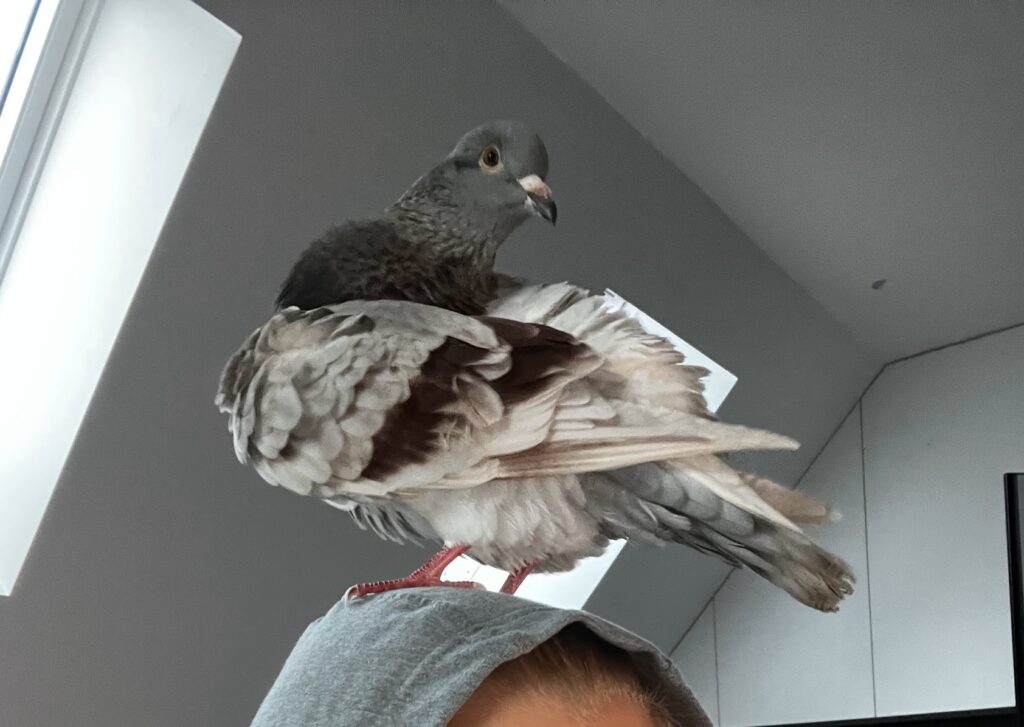
In one study, pigeons were trained to peck at a photograph of one person’s face, and then peck at a different photograph of a second person’s face.
The pigeons were then presented with a photograph of one of the two people’s faces, and were able to correctly identify which person it was more often than would be expected by chance.
This ability to differentiate between individuals suggests that pigeons are able to recognize and remember specific facial features, and may even have some level of face recognition abilities similar to those of humans.
Other studies have also shown that pigeons are able to recognize and remember individual objects, such as cars and buildings, suggesting that they have a strong ability to remember and recognize specific visual stimuli.
My pigeon is very smart
I have to give a shoutout to my own rescued pigeon, Gerard. I’ve had the pleasure of caring for Gerard for a year now, and I’ve been continually amazed by his intelligence and personality. From the moment I brought him home (when he was still a baby pigeon), he’s been a quick learner and has shown me time and time again just how intelligent these birds can be.
For example, Gerard has learned a few tricks that I’ve taught him, like flying to me on command. He’s also a pro at figuring out how to get to his food, even if I try to hide it from him. I’ve seen him use his beak to open closed containers and even figure out how to move objects around to get to his treats. It’s amazing to see how he uses his problem-solving skills and decision-making abilities to get what he wants.
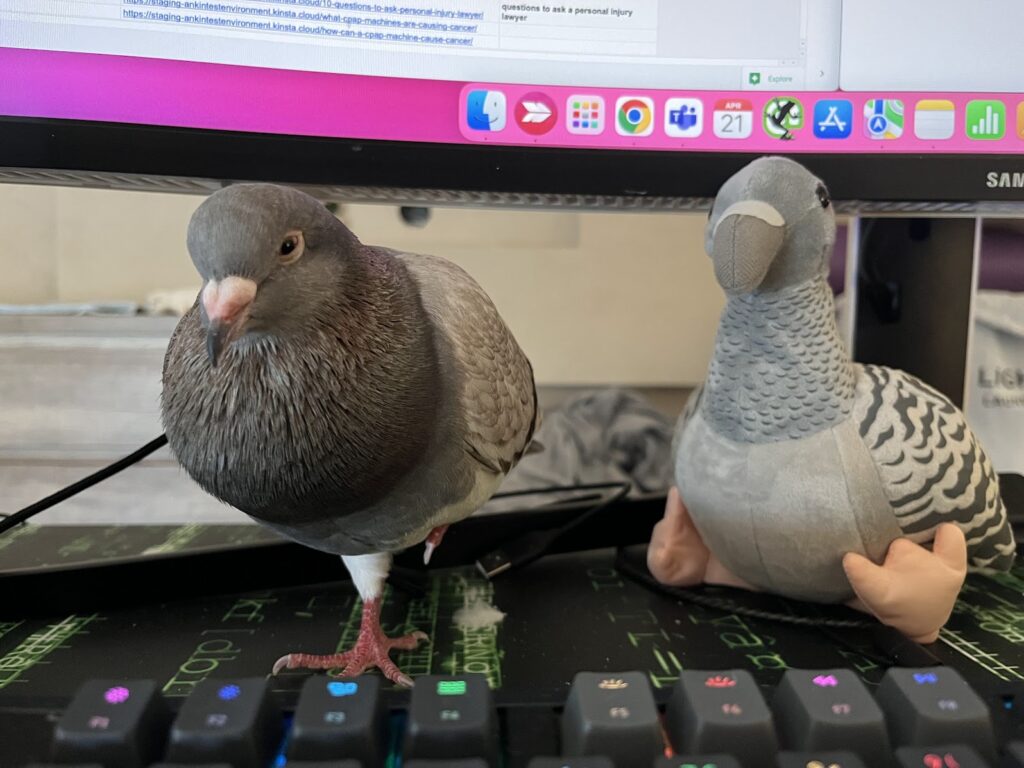
But it’s not just his cognitive abilities that have impressed me – Gerard is also a very social bird. He loves to coo and cuddle with me, and he’s always eager to interact with me and my family. He even seems to understand when we’re happy or sad and will respond appropriately. It’s clear that he has a lot of social intelligence and is able to communicate and connect with us in a meaningful way.
Overall, Gerard is a constant source of amazement for me, and I’m so grateful to have him in my life. He’s not just a pet – he’s a true companion, and I feel lucky to have the opportunity to learn from and connect with him every day. He’s a true testament to the intelligence and personality of these amazing birds.
Are pigeons smart? Yes! Final thoughts.
I hope you’ve learned a lot about these fascinating birds and their impressive cognitive abilities.
From their problem-solving skills and decision-making abilities to their memory and learning abilities and their social intelligence, there’s no denying that pigeons are some of the most intelligent animals out there.
As for the future of pigeon intelligence research, there’s still so much left to learn about these amazing birds.
Researchers are continuing to study pigeon cognition in more detail, using advanced techniques such as fMRI to understand the brain activity of these birds as they perform various tasks. There’s no doubt that we have much left to learn about pigeon intelligence, and I’m excited to see where this research takes us in the future.
In conclusion, I hope this article has given you a greater appreciation for the intelligence of pigeons.

